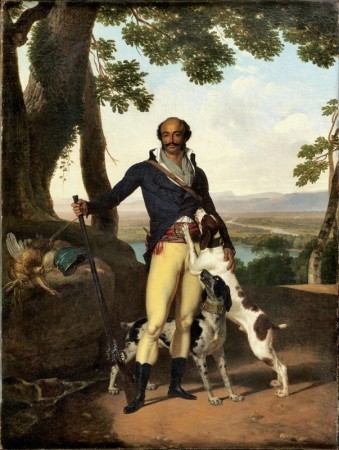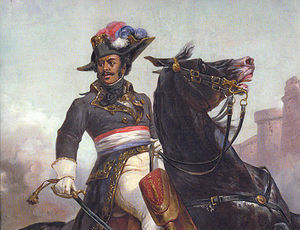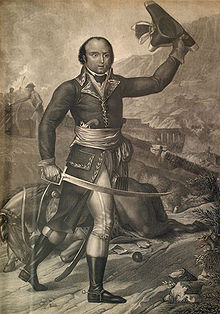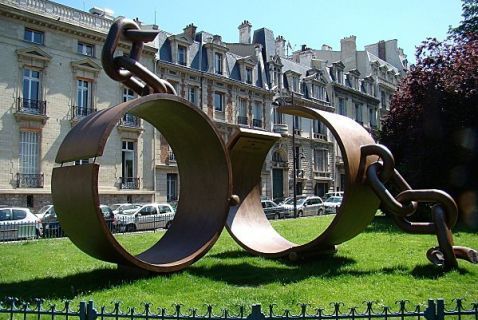Catching up on Classics (and lots more!) discussion

This topic is about
The Black Count
Buddy Reads
>
Black Count, The -- Buddy Read
message 2:
by
Katy, Quarterly Long Reads
(last edited Feb 24, 2015 09:03PM)
(new)
-
rated it 5 stars
2013 Pulitzer Prize Winner for Biography
By the author of the internationally bestselling biography The Orientalist: Solving the Mystery of a Strange and Dangerous Life, The Black Count: Glory, Revolution, Betrayal, and the Real Count of Monte Cristo brings to life one of history’s great forgotten heroes: a man almost unknown today yet with a personal story that is strikingly familiar. His swashbuckling exploits appear in The Three Musketeers, and his triumphs and ultimate tragic fate inspired The Count of Monte Cristo . His name is Alex Dumas. Father of the novelist Alexandre Dumas, Alex has become, through his son's books, the model for a captivating modern protagonist: the wronged man in search of justice.
Born to a black slave mother and a fugitive white French nobleman in Saint-Domingue (present-day Haiti), Alex Dumas was briefly sold into bondage but then made his way to Paris where he was schooled as a sword-fighting member of the French aristocracy.
He was only 32 when he was given command of 53,000 men, the reward for series of triumphs that many regarded as impossible, and then topped his previous feats by leading a raid up a frozen cliff face that secured the Alps for France. It was after his subsequent heroic service as Napoleon’s cavalry commander that Dumas was captured and cast into a dungeon–and a harrowing ordeal commenced that inspired one of the world’s classic works of fiction.
The Black Count is simultaneously a riveting adventure story, a lushly textured evocation of 18th-century France, and a window into the modern world’s first multi-racial society. But it is also a heartbreaking story of the enduring bonds of love between a father and son. Drawing on hitherto unknown documents, letters, battlefield reports and Dumas' handwritten prison diary, The Black Count is a groundbreaking masterpiece of narrative nonfiction.
http://www.pulitzer.org/works/2013-Bi...
By the author of the internationally bestselling biography The Orientalist: Solving the Mystery of a Strange and Dangerous Life, The Black Count: Glory, Revolution, Betrayal, and the Real Count of Monte Cristo brings to life one of history’s great forgotten heroes: a man almost unknown today yet with a personal story that is strikingly familiar. His swashbuckling exploits appear in The Three Musketeers, and his triumphs and ultimate tragic fate inspired The Count of Monte Cristo . His name is Alex Dumas. Father of the novelist Alexandre Dumas, Alex has become, through his son's books, the model for a captivating modern protagonist: the wronged man in search of justice.
Born to a black slave mother and a fugitive white French nobleman in Saint-Domingue (present-day Haiti), Alex Dumas was briefly sold into bondage but then made his way to Paris where he was schooled as a sword-fighting member of the French aristocracy.
He was only 32 when he was given command of 53,000 men, the reward for series of triumphs that many regarded as impossible, and then topped his previous feats by leading a raid up a frozen cliff face that secured the Alps for France. It was after his subsequent heroic service as Napoleon’s cavalry commander that Dumas was captured and cast into a dungeon–and a harrowing ordeal commenced that inspired one of the world’s classic works of fiction.
The Black Count is simultaneously a riveting adventure story, a lushly textured evocation of 18th-century France, and a window into the modern world’s first multi-racial society. But it is also a heartbreaking story of the enduring bonds of love between a father and son. Drawing on hitherto unknown documents, letters, battlefield reports and Dumas' handwritten prison diary, The Black Count is a groundbreaking masterpiece of narrative nonfiction.
http://www.pulitzer.org/works/2013-Bi...
I started this and it is well written. Interesting how race relations change over time. And loving the connections that the author has made so far with Dumas' novels and his father's life.
Haven't read Georges, but put it on my TBR list.
Haven't read Georges, but put it on my TBR list.
 I'm up to chapter 7 and I agree that the fight for racial equality for blacks in France is interesting. It amazes me that this is the latter part of the 18th century. Of course no one cared about blacks in the colonial islands, only in France.
I'm up to chapter 7 and I agree that the fight for racial equality for blacks in France is interesting. It amazes me that this is the latter part of the 18th century. Of course no one cared about blacks in the colonial islands, only in France. And it is amazing that only black people were subjected to racist laws. Indians, Chinese, Middle Easterners and so forth were equal under the law. But I wonder how that worked out in practice.
 Perhaps the reason why Persons of African descent (or part, as the case may be) were subject to these laws rather than other persons of color was because these laws, though applied to free Black people, in some way supported slavery in the very wealthy sugar colonies that depended on slave (African) labor and laws restricting free appeased the colonials.
Perhaps the reason why Persons of African descent (or part, as the case may be) were subject to these laws rather than other persons of color was because these laws, though applied to free Black people, in some way supported slavery in the very wealthy sugar colonies that depended on slave (African) labor and laws restricting free appeased the colonials. The author doesn't say this though. I'm just offering a theory.
 Andrea, you may be right. I suppose that I am comparing these laws to the US where non-whites of any national origin were subject to various racist laws. It didn't matter that only those of African descent were slaves. Everyone was unequal under the law.
Andrea, you may be right. I suppose that I am comparing these laws to the US where non-whites of any national origin were subject to various racist laws. It didn't matter that only those of African descent were slaves. Everyone was unequal under the law.
 I read this amazing book back in July 2014, but I loved it so much that I know I'll enjoy revisiting it will so many friends. Is it okay if chime in on occasion with some of my notes from back then and thoughts from now, Kathy?
I read this amazing book back in July 2014, but I loved it so much that I know I'll enjoy revisiting it will so many friends. Is it okay if chime in on occasion with some of my notes from back then and thoughts from now, Kathy?
message 13:
by
Katy, Quarterly Long Reads
(last edited Mar 04, 2015 03:31PM)
(new)
-
rated it 5 stars
Do it, Hana!
And I'd like to know how you take and organize your notes for books. That is something I'm not very good at.
I am just through Part 1.
Great piece of history with the French Revolution and the American War for Independence. I always knew that the French gave much support for the US, but didn't realize how much it bankrupted them.
Wonderful writing. I keep sneaking to read another chapter and not getting as much other things done as I need to.
And I'd like to know how you take and organize your notes for books. That is something I'm not very good at.
I am just through Part 1.
Great piece of history with the French Revolution and the American War for Independence. I always knew that the French gave much support for the US, but didn't realize how much it bankrupted them.
Wonderful writing. I keep sneaking to read another chapter and not getting as much other things done as I need to.
 My husband is a history teacher, and he's always told me what a bad deal the French got after giving the US so much help. We would have lost without them and they went bankrupt to help us. Not much gratitude from our new government though.
My husband is a history teacher, and he's always told me what a bad deal the French got after giving the US so much help. We would have lost without them and they went bankrupt to help us. Not much gratitude from our new government though.
 Hana, I'd like to know how you organize your notes, take them etc as well.
Hana, I'd like to know how you organize your notes, take them etc as well.Please feel free to chime in! :)
 Laurie wrote: "My husband is a history teacher, and he's always told me what a bad deal the French got after giving the US so much help..." That really struck me as well!
Laurie wrote: "My husband is a history teacher, and he's always told me what a bad deal the French got after giving the US so much help..." That really struck me as well!One the organizational side: I try to carve out computer & device-free time for reading usually in the evening and as I'm reading I use little stick on flags and Post-it notes to mark things that get to me.
Then in the my morning, along with my cup of tea, I enter notes on the Updates section of my Goodreads review. Sometimes if it's a long quote or if I want to include a map or link or illustration I'll used the Comments section.
Typically, by the time I'm done I've got dozens of quotes and extra info to go over. I copy and paste stuff into an MS Word document and use that to organize my thoughts enough to write a coherent review.
This is all totally new for me and I have GR to thank for it! I no longer have that horrible "....gee...did I ever read that one?" feeling :)
 The way slaves were treated in the French colonies really shocked me: "Some underfed slaves were forced to wear tin plate masks in 100 degree heat to keep them from eating any of the cane. The brutality of the American Cotton Kingdom a century later could not compare to that of Sainte Domingue in the 1700s...North American slavery was not based on a business model of systematically working slaves to death. The French sugar plantations were a charnel house." p. 30
The way slaves were treated in the French colonies really shocked me: "Some underfed slaves were forced to wear tin plate masks in 100 degree heat to keep them from eating any of the cane. The brutality of the American Cotton Kingdom a century later could not compare to that of Sainte Domingue in the 1700s...North American slavery was not based on a business model of systematically working slaves to death. The French sugar plantations were a charnel house." p. 30
I agree with you Hana. Slaves as disposal property takes it to a new low. I read that in a book I finished last year, I think in Salt: A World History (but not positive).
And thanks for the notes tips.
And thanks for the notes tips.
This is a fascinating view of the French Revolution. (A bit more than half-way through now) My only other French Revolution history that I have read has been in (embarrassingly true) from Les Misérables and Madame Tussaud: A Novel of the French Revolution, both novels.
 I didn't know the French attacked so many other countries during the years before Napoleon was emperor. I thought that was mostly the result of Napoleon wanting to expand the empire, not the leaders of the revolution wanting to free the worker class in those countries.
I didn't know the French attacked so many other countries during the years before Napoleon was emperor. I thought that was mostly the result of Napoleon wanting to expand the empire, not the leaders of the revolution wanting to free the worker class in those countries.
 Laurie, I didn't know that France was busy attacking everyone (other countries) either!
Laurie, I didn't know that France was busy attacking everyone (other countries) either!I too thought all of that started with Bonaparte.
Andrea (Catsos Person) wrote: "Kathy, those two books are exactly the sources of my knowledge of the Fr Revolution! Ha"
Awesome!
Awesome!
Laurie wrote: "I didn't know the French attacked so many other countries during the years before Napoleon was emperor. I thought that was mostly the result of Napoleon wanting to expand the empire, not the leader..."
Ladies, I am in the same boat as you.
Ladies, I am in the same boat as you.
 One thing I don't understand is if the Fr economy had collapsed and the money that was being printed wasn't worth anything, how did they manage to afford to attack all of the countries and Italian city-states?
One thing I don't understand is if the Fr economy had collapsed and the money that was being printed wasn't worth anything, how did they manage to afford to attack all of the countries and Italian city-states?Wars are expensive. How did they do it?
 Andrea (Catsos Person) wrote: "One thing I don't understand is if the Fr economy had collapsed and the money that was being printed wasn't worth anything, how did they manage to afford to attack all of the countries and Italian ..."
Andrea (Catsos Person) wrote: "One thing I don't understand is if the Fr economy had collapsed and the money that was being printed wasn't worth anything, how did they manage to afford to attack all of the countries and Italian ..."That's a great question that I hadn't considered. Since they were killing off all the old nobility and anyone connected to the monarchy and the government most of whom would have been rich, did they seize their possessions and use that to help payroll the war?
I am also up to chapter 14. I plan to try finishing this by Monday, but it might not be possible.
 I now see the answer to the war funding question in chapter 14.
I now see the answer to the war funding question in chapter 14."Since 1793, the French revolutionary armies had revived the old tradition of pillage in a highly organized way; it was designed to avoid inflicting extreme suffering and starvation, which could cause revolt, while maximizing the profits of war for the republican liberators. Parisian art lovers benefited from each campaign, as the Louvre galleries filled with new works from around Europe."
It goes on to say that Napoleon instituted fees on the areas he conquered in Italy as the price for freedom from the Austrian empire. "In small towns that could not supply artwork, jewels, cash or gold, the requisitions came in the form of sacks of flour or rations of meat and casks of wine".
 Laurie wrote: "I now see the answer to the war funding question in chapter 14.
Laurie wrote: "I now see the answer to the war funding question in chapter 14."Since 1793, the French revolutionary armies had revived the old tradition of pillage in a highly organized way; it was designed to ..."
I had asked the questions above re how Fr funded their wars during the revolution just before I started Ch 14. This chapter explains it all.
The more I learn about NB, the more of a monster he seems.
Those of us who have read W&P or are familiar with the outcome of NB's disastrous invasion of Russia can see that by the method of compensating and supplying the army in the way described in CH 14 (i havn't completed it yet, but I think I am near the end. hard to tell where I am with an eBook) can see the weakness in feeding/paying the army in this way as the Russians taught him a costly lesson.
 The author in CH 14, describes that during his research, he found some portraits of generals of the times that included one of Alex Dumas.
The author in CH 14, describes that during his research, he found some portraits of generals of the times that included one of Alex Dumas.How sorry I am that the author did not include it in the book.
One of the reviewers for this book actually decreased his/her rating because no image of ADumas were included in the book or even a statue of him that the reviewer says was destroyed by the Nazis.
I certainly would like to see what he looked like.
message 34:
by
Katy, Quarterly Long Reads
(last edited Mar 07, 2015 07:09PM)
(new)
-
rated it 5 stars
Some paintings said to be portraits of General Dumas:

Portrait of a Hunter in a Landscape, attributed to Louis Gauffier (1762-1801), is said to be a portrait of General Dumas.

Alexandre Dumas, painting by Olivier Pichat

Thomas-Alexandre Dumas, c.1800, in Republican Army uniform
These all look a bit different from each other.

Portrait of a Hunter in a Landscape, attributed to Louis Gauffier (1762-1801), is said to be a portrait of General Dumas.

Alexandre Dumas, painting by Olivier Pichat

Thomas-Alexandre Dumas, c.1800, in Republican Army uniform
These all look a bit different from each other.
 The painting by Pichat is very similar to the book's cover. The face is different but the pose and uniform are very much alike.
The painting by Pichat is very similar to the book's cover. The face is different but the pose and uniform are very much alike.Andrea, I know what you mean about the way things ended for NP in Russia. I just finished W&P yesterday, so it feels like I've done lots of reading about him lately.
 Andrea (Catsos Person) wrote: "Laurie, I didn't know that France was busy attacking everyone (other countries) either!
Andrea (Catsos Person) wrote: "Laurie, I didn't know that France was busy attacking everyone (other countries) either!I too thought all of that started with Bonaparte."
Eh, the history of Europe is full of wars fought all over, all countries probably started their fair share of them and for various reasons. I didn't even bother to start learning all of them in school, just the main ones. For many there were probably more war years than times of peace when even countries like Sweden and Denmark fought 27 wars against each other between 1521 and 1814 (according to Wikipedia).
Btw, you are probably all aware that Alexander Pushkin was of African heritage. His grand-father was a general to Peter the Great.
message 38:
by
Katy, Quarterly Long Reads
(last edited Mar 10, 2015 05:01PM)
(new)
-
rated it 5 stars
Found some information on the statue of General Dumas. Thinking this is the picture the author mentioned in the book. Sorry, it is in French.

and the new monument

Source: http://paris1900.lartnouveau.com/pari...
and here: http://raphael.afrikblog.com/archives...

and the new monument

Source: http://paris1900.lartnouveau.com/pari...
and here: http://raphael.afrikblog.com/archives...
 Kathy, I'm loving this!
Kathy, I'm loving this! Just completed ch 16.
This is truly an amazing book, about an amazing man.
This book is exciting.
 Kathy wrote: "Finished the book. Loved it."
Kathy wrote: "Finished the book. Loved it."It's been a while since I read The Count of Monte Christo and have been wanting to re-read it. I can't decide which to start first. Do you think I would get more out of the Black Count reading The Count of Monte Christo first or the other way around?
 Jalila, I read TCoMC many years ago and don't remember the details well. I truly think you can read either first and it won't make much difference.
Jalila, I read TCoMC many years ago and don't remember the details well. I truly think you can read either first and it won't make much difference.
 I just finished and I also enjoyed this very much. What a sad ending for such a brave and patriotic man. My dislike of Bonaparte knows no bounds.
I just finished and I also enjoyed this very much. What a sad ending for such a brave and patriotic man. My dislike of Bonaparte knows no bounds.
I would agree. I don't think it matters either way you read the books. The Black Count: Glory, Revolution, Betrayal, and the Real Count of Monte Cristo does allude to some of Dumas' books including The Count of Monte Cristo, but none of them are real spoilers in my opinion.
 Laurie wrote: "My dislike of Bonaparte knows no bounds."
Laurie wrote: "My dislike of Bonaparte knows no bounds."But then again, Wikipedia tells us: "Napoleon implemented a wide array of liberal reforms in France and across Europe, especially in Italy and Germany, as summarized by British historian Andrew Roberts:"
The ideas that underpin our modern world–meritocracy, equality before the law, property rights, religious toleration, modern secular education, sound finances, and so on–were championed, consolidated, codified and geographically extended by Napoleon. To them he added a rational and efficient local administration, an end to rural banditry, the encouragement of science and the arts, the abolition of feudalism and the greatest codification of laws since the fall of the Roman Empire.
 Kathy wrote: "Found some information on the statue of General Dumas. Thinking this is the picture the author mentioned in the book."
Kathy wrote: "Found some information on the statue of General Dumas. Thinking this is the picture the author mentioned in the book."Great find, Kathy! I have to read a history of the Napoleonic era soon. I tend to see it from the British perspective, which of course is relentlessly negative. The Black Count reinforced my prejudice. But Tytti, that quote is clearly food for thought!
 Hana, I will look forward to your updates and review when you get to read a history of the Napoleonic Era. :)
Hana, I will look forward to your updates and review when you get to read a history of the Napoleonic Era. :)
 I guess equality before the law unless you were non-white or Jewish was what the quotation should say. Still not a fan of NP even if there were some positive effects resulting from his reign.
I guess equality before the law unless you were non-white or Jewish was what the quotation should say. Still not a fan of NP even if there were some positive effects resulting from his reign.
 "Napoleon Bonaparte of the First French Empire enacted laws that emancipated European Jews from old laws restricting them to ghettos, as well as the many laws that limited Jews' rights to property, worship, and careers."
"Napoleon Bonaparte of the First French Empire enacted laws that emancipated European Jews from old laws restricting them to ghettos, as well as the many laws that limited Jews' rights to property, worship, and careers.""Heine and Börne both record their sense of obligation to the liberality of Napoleon's principles of action, and the German Jews in particular have always regarded Napoleon as one of the chief forerunners of emancipation in Germany. When Jews were selecting surnames, some of them are said to have expressed their gratitude by taking the name of "Schöntheil," a translation of "Bonaparte," and legends grew up about Napoleon's activity in the Jewish ghettos. Primo Levi said that the Italian Jews often chose Napoleone as their given name to recognize their liberator."
http://en.wikipedia.org/wiki/Napoleon...
Books mentioned in this topic
The Black Count: Glory, Revolution, Betrayal, and the Real Count of Monte Cristo (other topics)The Count of Monte Cristo (other topics)
Les Misérables (other topics)
Madame Tussaud: A Novel of the French Revolution (other topics)
Salt: A World History (other topics)
More...





Everyone is invited to join us. Starting soon.